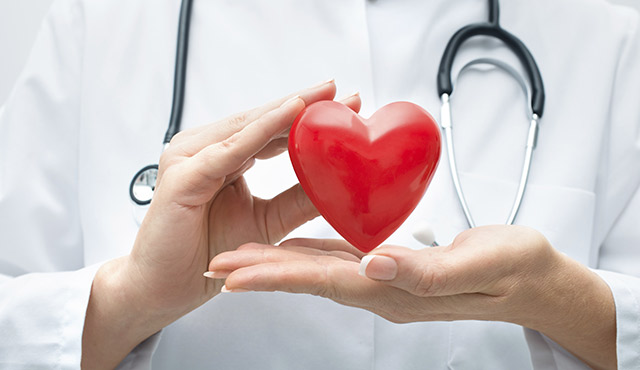Lying in a hospital bed as the embers of life slowly drift away because the heart has succumbed to disease, the lungs no longer draw breath or the kidneys fail to function is a sad reality for many patients waiting for an organ donation. Every day, an average of 21 people die while waiting for organ transplants, according to the U.S. Department of Health & Human Services.
Currently, there are more than 120 million people signed in the U.S. as organ donors, but the need is still great. With that in mind, the Church has set clear guidelines to help Catholics better understand their decision to become a donor.
“In the image of God the Creator, Christians are called to live an authentic culture of life, which is built up by gestures of sharing,” says Father Joseph Son Nguyen, the lead chaplain at UC Irvine Medical Center. “Organ donation is encouraged because it is an edifying example of living out the gospel of life.”
Beyond his work as a chaplain, Father Joseph has a doctoral degree in moral theology and biomedical ethics and specializes in ethical anthropology and the ethics of genetic patenting.
Expanding on the importance of organ donation, he adds, “Scriptural references to God as life and love abound; and these scriptural themes are eloquently expounded in one of the most important papal encyclicals of Saint Pope John Paul II, Evangelium Vitae, where he begins with the a quote from the Gospel according to St. John: ‘I came that they may have life, and have it abundantly’ (Jn 10:10).”
Each day, an average of 79 people are given the gift of life as a result of an organ transplant. In 2013, the lives of 28,854 people were saved and prolonged because of an organ donor.
Not only can organ donation save a life, it can save on medical bills. “Patients with kidney failure consume a disproportionate share of healthcare expenditures,” says Dr. Ervine Ruzics, director of St. Joseph Hospital’s Transplant Center in Orange.
“Transplantation is significantly less expensive than dialysis. Consequently, more organ donors are a benefit to everybody.”Although the Church supports organ donation as an act of love and charity, there are moral principles that require limits to donating. The U.S. Catholic Bishops offer guidance in the Ethical and Religious Directives for Catholic Health Care. Catholic health care institutions are directed to encourage patients to donate their organs and bodily tissue for transplantation and research after death. However, Father Joseph notes that Catholics who desire to donate one of their organs while they are still living may do so only if the donation does not “sacrifice or seriously impair any essential bodily function” and the good of the donation outweighs the harm done to the donor.
Dr. Ruzics offers an example: “A person can donate a kidney if he has two healthy kidneys, but a person in poor health should not donate a kidney because it would affect his or her health. Although everyone has two eyes, no one should donate an eye because it would be mutilating and would diminish the vision.”
The Church mandates that before making a decision, donors must fully understand the risks and benefits involved. Additionally, Catholics must not seek out financial gain and must respect the freedom of the donor.
Essential organs needed for life should only be removed after it has been medically determined the patient has died, according to the Ethical and Religious Directives. Some people may fear that if becoming an organ donor a medical team will be less likely to save their life in order to obtain more organs. To prevent this from occurring, the U.S. Bishops require that, “the physician who determines death should not be a member of the transplant team.”
In recent years, there have been numerous scientific and philosophical debates regarding the absolute definition of death, and specifically “brain death.” “It suffices to say that the Church generally accepts the current scientific consensus that the criteria for true death are spontaneous cardio-pulmonary cessation and irreversible cessation of all functioning of the brain,” says Father Joseph.
In the case of children, infants and other people unable to give consent to organ donation, the Catechism of the Catholic Church states, “Organ transplants are not morally acceptable if the donor or those who legitimately speak for him have not given their informed consent.”
Parents or legal guardians may agree to a donation after a child has died, says Father Joseph, but “controversies surround the issue of donation by those considered ‘non-living,’ such as anencephalic babies, aborted fetuses and entities that are procured from embryonic stem cell or so-called ‘therapeutic cloning’ processes. The Church has clearly stated opposition to procuring organ donation in these cases.”
A discussion with loved ones about specific requirements and limits for organ donation before checking the organ donation box on one’s driver’s license may prove helpful. It’s also helpful to remember that more than 120,000 people currently are in need of a lifesaving organ transplant.
Father Joseph points once again to John Paul II as a guide. “Referring to organ donation as it relates to the gospel of life, John Paul II wrote, ‘A particularly praiseworthy example of such gestures is the donation of organs, performed in an ethically acceptable manner, with a view to offering a chance of health and even of life itself to the sick who sometimes have no other hope.’” (Evangelium Vitae, # 86).

